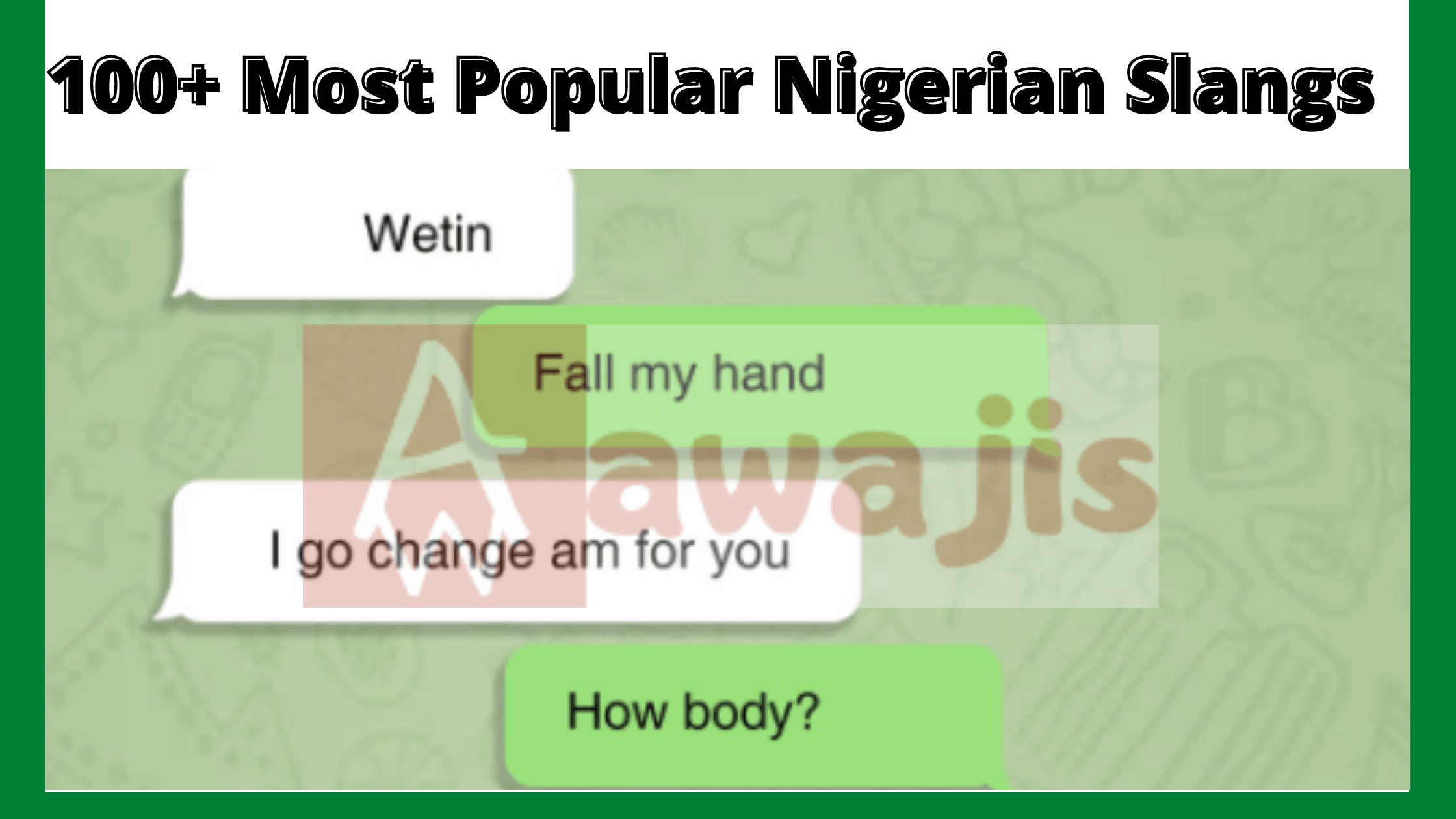Nigerian Slangs: Understanding The Colorful Language Of Nigeria
Nigerian slangs are an essential part of the vibrant culture and communication style in Nigeria. These slangs reflect the rich diversity of languages and ethnicities in the country, and they are often used in everyday conversations among Nigerians. From urban centers to rural communities, the use of slangs has become a distinctive feature of Nigerian English, adding flavor and character to the language.
In this article, we will explore the fascinating world of Nigerian slangs, their origins, and their significance in modern communication. As we dive into this topic, we will also provide insights into the various contexts in which these slangs are used, making it easier for both locals and foreigners to understand and appreciate this unique aspect of Nigerian culture.
Whether you are a language enthusiast, a traveler planning to visit Nigeria, or simply curious about the country's culture, understanding Nigerian slangs will enhance your experience and interactions. Join us as we unravel the meanings and usages of some popular Nigerian slangs and how they reflect the dynamic nature of the Nigerian society.
Table of Contents
- What are Nigerian Slangs?
- Origins of Nigerian Slangs
- Popular Nigerian Slangs
- The Importance of Slangs in Nigeria
- How to Use Nigerian Slangs
- Misunderstandings and Misuses
- Nigerian Slangs in Pop Culture
- Conclusion
What are Nigerian Slangs?
Nigerian slangs refer to informal and colloquial expressions used predominantly in Nigeria. They are often derived from various Nigerian languages, English, and even Pidgin English. These slangs can change rapidly and may have different meanings depending on the context in which they are used. One of the intriguing aspects of Nigerian slangs is their ability to evolve and adapt to new trends and influences.
Origins of Nigerian Slangs
The origins of Nigerian slangs can be traced back to Nigeria's diverse linguistic landscape, which includes over 500 indigenous languages. Many slangs are rooted in these languages, showcasing the country’s multicultural heritage. English, being the official language, also plays a significant role in the development of Nigerian slangs, especially in urban areas where English is widely spoken.
Additionally, the influence of globalization, social media, and pop culture has contributed to the emergence of new slangs. As people communicate through various platforms, slangs can spread quickly, gaining popularity among different age groups and communities.
Popular Nigerian Slangs
There are countless Nigerian slangs, each with its own unique meaning and usage. Here are some of the most popular slangs you might encounter:
Common Slang Expressions
- Wahala: Refers to trouble or problems. For example, "No wahala" means "No problem."
- Jollof: While it primarily refers to a popular rice dish, it can also be used to describe something that is great or amazing. For instance, "That party was jollof!"
- Omo: Literally means "child" in Yoruba, but is commonly used to refer to a girl or young woman. For example, "That omo fine!" means "That girl is beautiful!"
- Gbese: This means "to owe" or "to be in debt." For instance, "I don gbese you" translates to "I owe you."
- Flex: To have fun or enjoy oneself. For example, "Let’s flex this weekend!"
Regional Variations of Slangs
Different regions in Nigeria have their own unique slangs influenced by local languages and cultures. For example:
- From Lagos: "E be like say" - This means "It seems like" and is commonly used in conversations.
- From Abuja: "No vex" - This means "Don't be angry" and is often used to apologize.
- From Port Harcourt: "Chop" - This means "to eat." For instance, "Make we chop" means "Let’s eat."
The Importance of Slangs in Nigeria
Nigerian slangs play a crucial role in communication and social interactions. They serve several purposes, including:
- Creating Identity: Slangs can signify belonging to a particular group or community.
- Enhancing Communication: They can make conversations more engaging and relatable.
- Reflecting Culture: Slangs encapsulate cultural values, humor, and the creative spirit of Nigerians.
How to Use Nigerian Slangs
Using Nigerian slangs can be an enjoyable way to connect with locals. Here are some tips to consider:
- Context Matters: Always pay attention to the context in which a slang is used to avoid misunderstandings.
- Observe and Learn: If you are new to Nigerian culture, listen to how locals use slangs in conversations.
- Be Respectful: While slangs are informal, using them appropriately shows respect for the culture.
Misunderstandings and Misuses
As with any language, misunderstandings can occur when using slangs. Non-native speakers may misinterpret the meanings or use them inappropriately. To minimize confusion:
- Ask locals for clarification if you are unsure about a slang.
- Be mindful of the audience when using slangs, especially in formal settings.
Nigerian Slangs in Pop Culture
Nigerian slangs have gained significant popularity in pop culture, especially through music, movies, and social media. Artists often incorporate slangs into their lyrics, making them resonate with the youth. As a result, slangs have transcended regional boundaries and are now widely recognized beyond Nigeria.
Conclusion
In summary, Nigerian slangs are a vibrant and integral part of the country's culture and communication style. They reflect the rich linguistic diversity and creativity of Nigerians. Understanding and using these slangs can enhance your interactions and appreciation of Nigerian culture. We encourage you to engage with locals, learn more about their expressions, and immerse yourself in the beauty of Nigerian language.
If you found this article helpful, please leave a comment, share it with others, or explore more articles on our site to deepen your understanding of Nigerian culture and language.
Thank you for reading, and we hope to see you back soon for more exciting insights!
Hollywood Comedians: The Pioneers Of Laughter
Exploring The Life And Career Of Sonji Roi: The Iconic Dancer And Performer
Chika Shihōin: The Rising Star Of Japanese Entertainment


